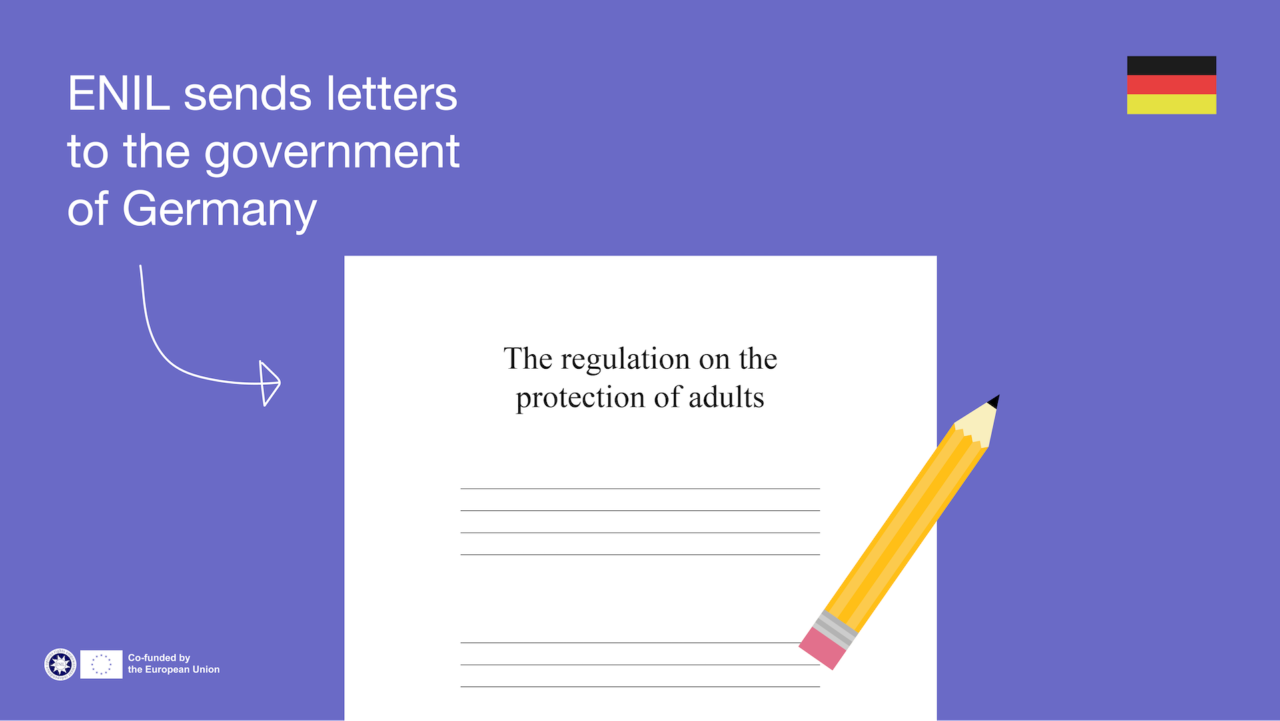Changes to the draft regulation on the protection of adults are urgently needed. This week ENIL sent a package containing letters, a position paper and amendments to the German government given its likely pivotal role.
The draft regulation on the protection of adults in cross-border situations is causing ENIL and other disability rights organisations great concern. Significant advocacy activities are being conducted to effectuate changes to the legislation.
Background
The content of the draft regulation rests on the assumption that a person might be unable to protect their own interest due to “an impairment or insufficiency of their personal faculties”. Mostly disabled people or older people would fall under this definition. The regulation intends to resolve the question which country´s authorities are in charge if a person regarded as lacking in personal faculties, moves to another EU member state.
In the regulation the European Commission proposes that the authorities of the new member state should automatically take charge of the “vulnerable” adult and receive permission to decide about matters such as. “(a) the determination of the incapacity of an adult and the institution of a protective regime, (b) the placing of an adult under the protection of a judicial or administrative authority, (c) guardianship, curatorship and analogous institutions … (e) decisions concerning the placement of the adult in an establishment or other place where protection can be provided.
Conflict with the UN CRPD
The draft regulation promotes deprivations of legal capacity. That approach is in sharp violation of the United Nations Convention on the Rights of Persons with Disabilities (UN CRPD). In a statement the special rapporteur on the rights of persons with disabilities confirmed that under the UN CRPD the notion of incapacity does not exist and a transfer of the rights of personhood is not possible.[1] Recently, legal experts from the Bochum Centre for Disability Studies confirmed the assessment that the Commission proposal violates the Convention.[2] Article 12 stated that disabled people enjoy legal capacity on an equal level to others and obliged member states to replace laws on substituted decision-making with rules on supported decision-making. The regulation is also in conflict with article 5 which establishes that disabled people are equal before the law, article 14 on the right to be free of deprivations of liberty and article 19 on living independently in the community.
Already 13 EU countries have largely abolished substituted decision-making. Should the draft regulation be adopted, it would put this progress in jeopardy by giving new legitimacy to deprivations of legal capacity.
Advocacy activities
The European Network on Independent Living, the European Disability Forum and Mental Health Europe are conduction joint advocacy activities to effectuate changes to the draft regulation. We believe that a large overhaul is necessary. All references to deprivations of legal capacity need to be replaced by paragraphs on supported decision-making. Thus, the regulation also presents an opportunity to improve the acceptance of supported decision-making.
In May and June meetings with representatives of the Belgium government took place to communicate the concerns, since the country was holding the presidency of the EU Council. The ENIL position paper and amendments were handed to the Belgians. Our documents were also sent to representatives from the Maltese government. A meeting to elaborate our positions will likely take place in July.
In the discussions on EU legislation, Germany is frequently playing a pivotal role in the EU Council since it is holding a large share of the votes given it is the most populated country in the EU. In cooperation with our German member, Interessenvertretung Selbstbestimmt Leben (ISL e.V.), letters were prepared to ask the government of Germany to use its influence to have the draft regulation changed. This week a package containing the letters, amendments and a position paper were sent together with a request for meetings. An article was published in the specialised news-outlet kobinet.
We hope the efforts will pay off and move governments to recognise the risks this draft regulation represents. ENIL will keep you informed about the progress of its advocacy campaign.
- Our letter to the Ministry of Justice can be downloaded in pdf and in word. The letter to the Ministry of Social Affairs is available in pdf and in word too. The letters are only available in German
- Our position paper can be downloaded in English in pdf and in word format here and in the original German is available in pdf and in word too.
- Our amendments can be downloaded in English in word format here and in the original German is available in pdf and in word too.
[1] Joint Submission. Towards Greater Coherence on International Law. Reflections on the adequacy of the European Commission´s proposal for a Regulation and Council Decision governing the Hague Convention on the Protection of Adults. Available at: https://www.ohchr.org/sites/default/files/documents/issues/disability/olderpersons/Annex-Joint-Submission-Towards-Greater-Coherence-International-Law.pdf
[2] https://www.bodys-wissen.de/beitrag-anzeigen/bodys-stellungnahme-grenzueberschreitender-schutz-schutzbeduerftiger-erwachsener.html



